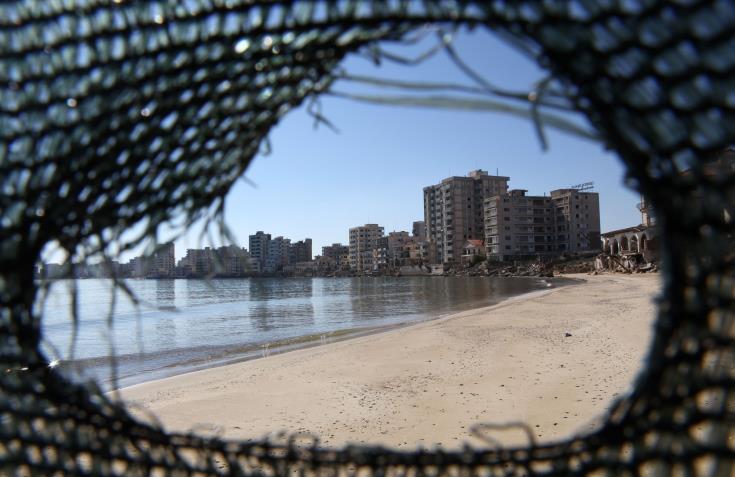
AKEL backs the efforts towards a solution and not the government’s policies
Extract from a speech of Andros Kyprianou, General Secretary of the C.C. of AKEL
18th March 2014, Conference Centre, Nicosia
The solution of the Cyprus problem is still pending, which we must not downgrade at all for the sake of the economy. The first point I would like to clear up in relation to our Party’s position on the talks due to resume is the following: we do not support personally President Anastasiades, or the policies of the governing Democratic Rally DISY party. We are backing the efforts aiming at the solution of the Cyprus problem. We do so consciously because without a solution of the Cyprus problem our people, both Greek Cypriots and Turkish Cypriots, will be condemned to live in very difficult conditions that will constitute a threat to their very survival.
A non-solution of the Cyprus problem does not mean “the Turkish Cypriots should live separately on one side and we on the other, so everything will be fine”, as many circles and forces are trying to persuade our people for some time now. A non-solution of the Cyprus problem means the vindication of the 1974 imperialist plans that sought to divide Cyprus, handing over half of Cyprus to Turkey. It would mean cohabitating with thousands of troops of the Turkish Army and the settlers, as well as with a pseudo-state that will be controlled by Turkey inside our own country.
All these dangers are real. At the same time, the fruitless passage of time without action is increasingly consolidating the faits accomplis of the occupation. Fundamental principles and goals of the Greek Cypriot side are being undermined.
The situation on the ground is changing, resulting in the possibility for substantial territorial adjustments being eroded. The properties of the Greek Cypriots in the occupied areas are also altering, in a way that will make their restoration to the lawful owners even more difficult. Some of these properties are being sold at humiliating prices in the occupation regime through the so-called Compensation Committee that is regretfully functioning with the blessing of the European Court of Human Rights. The settlers are constantly growing in numbers, already making up a majority in the occupied areas. The Turkish Cypriots who support the solution and reunification at every opportunity are expressing their anguish about the on-going colonisation that is threatening the very identity of the Turkish Cypriot community, altering the demographic character and reducing the possibilities of reaching an agreement.
If the impasse continues we should have no doubts whatsoever that certain circles and forces within the European Union will raise the issue of the participation of Turkish Cypriots in the European Parliament. Already over the past few days certain circles are attempting to raise the issue of the direct trade with the occupied areas. We do not say this to exert blackmail in order to force the consent of the people to any unacceptable solution, but because we must stop misleading the people with empty rhetoric.
Therefore, there is no alternative other that the solution of the Cyprus problem. It is of course an extremely difficult path, which however we must take. Our weapon in this effort will be the long-standing positions of the Greek Cypriot side, International and European Law, the Resolutions of the United Nations and the 1977 and 1979 High-Level Agreements.
We warn that if the negotiations do not continue from where they had left off with Talat, the result will either be an endless and fruitless procedure with the danger of third parties seeking to impose a solution, or ending in evidently worse regulations. We insist on this position which has been vindicated as can be seen in the attempt to draw up a joint communique, not because we consider the existing convergences that were achieved before by Christofias and Talat flawless, nor because we consider ourselves as more capable than others.
It is a matter of simple logic. No matter how many difficulties we may have encountered with Talat, he wanted a solution. This is not the case with Eroglou, who even if he is seeking a solution the content he attaches to it is completely unacceptable. Consequently, it would be a utopia for anyone to believe that if we abandon the Christofias-Talat convergences that were achieved we could agree something better with Eroglou in the leadership of the Turkish Cypriot community. Besides, the document on the convergences 2008-2012 prepared by the UN Secretary-General Special Representative Alexander Downer, despite the inaccuracies that we had pointed out it contained, proves that all the talk about Christofias’ supposedly unacceptable concessions are merely a myth. This is what we were trying to point out all the time when those, even including Mr. Anastasiades carried away by the pre-election frenzy, were attempting to persuade otherwise.
However, there are two other “myths” which we must find the strength to talk openly about to the people. One of these myths is the one that argues that we must let time go by until we resolve our economic problems and then negotiate the Cyprus problem from a “position of strength”. Until then, all the dangers I have referred to above will have been consolidated and everything will have finished.
The second “myth” is that reunified Cyprus will need guarantor powers, either of foreign states, or from NATO. Historical experience teaches us that the interventions and interferences in the internal affairs of sovereign states only provoke sufferings and dependencies. Consequently, none of all those among the international community interested in a solution of the Cyprus problem cannot expect that we will support such a development.
As AKEL, we expressed our positions and views about the talks to the President of the Republic and at the National Council with good will in order to contribute positively to the dialogue. Any criticism we make is always done based on well-documented arguments and positions, having in mind that the current effort for a solution will be crucial and decisive for the future.
At the same time, we do not have any illusions. We live in a world determined by interests. A small and weak country is struggling for its rights, and has to face formidable powers and forces. This does not mean that we must give in and surrender, or that we should succumb to any behind the scenes wheeling and dealing that will bring partition in through the back door. This is the reason why we should all rise to the occasion. The Turkish Cypriot side should operate in practice and not in words with a positive will and adopt positive positions that should comply and be in line with the agreed framework.
The President of the Republic should negotiate based on positions of principle and be consistent and assertive, defending our people’s cause. The political forces should look at the situation with realism and wisdom and rise to the occasion.





